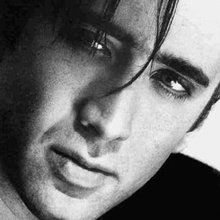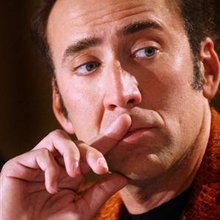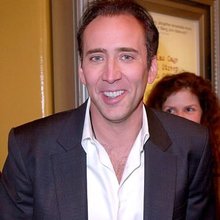Actor Nicolas Cage has always strived to make a name for himself based on his work, rather than on his lineage. As the nephew of filmmaker Francis Ford Coppola, Cage altered his last name to avoid accusations of nepotism. (He chose "Cage" both out of admiration for avant-garde musician John Cage and en homage to comic book hero Luke Cage). Even if he had retained the family name, it isn't likely that anyone would consider Cage holding fast to his uncle's coattails. Time and again, Cage travels to great lengths to add verisimilitude to his roles.Born January 7, 1964, in Long Beach, CA, to a literature professor father and dancer/choreographer mother, Cage first caught the acting bug while a student at Beverly Hills High School. After graduation, he debuted on film with a small part in Amy Heckerling's 1982 classic Fast Times at Ridgemont High. Following a lead role in Martha Coolidge's cult comedy Valley Girl (1983), Cage spent the remainder of the decade playing endearingly bizarre and disreputable men, most notably as Crazy Charlie the Appliance King in Peggy Sue Got Married (1986), Hi McDonough in Raising Arizona (1987), and Ronny Cammareri in the same year's Moonstruck, the last of which won him a Golden Globe nomination and a legion of female fans, ecstatic over the actor's unconventional romantic appeal.The '90s saw Cage assume a series of diverse roles, ranging from a violent ex-con in David Lynch's Wild at Heart (1990) to a sweet-natured private eye in the romantic comedy Honeymoon in Vegas (1992) to a dying alcoholic in Mike Figgis' astonishing Leaving Las Vegas (1995). For this last role, Cage won a Best Actor Oscar for his quietly devastating portrayal, and, respectability in hand, gained an official entrance into Hollywood's higher ranks. After winning his Oscar, along with a score of other honors for his performance, Cage switched gears in a way that would prove to be, with the occasional exception, largely permanent. He dove into a series of action movies like the Michael Bay thriller The Rock, the prisoners-on-a-plane movie Con Air, and the infamous John Woo flick Face/Off. Greeted with hefty paychecks and audience approval, Cage forged ahead on a career path lit largely with explosions.There would be exceptions, like 1998's City of Angels, a remake of Wim Wenders' Wings of Desire, and Martin Scorsese's Bringing Out the Dead, and the the lightly dramatic romantic comedy The Family Man, but Cage stuck mostly to thrillers and action movies. A spate of such films would fill his resume, like Gone in 60 Seconds, The Life of David Gale, 8MM, and Snake Eyes, but Cage would briefly revisit his roots in character work, teaming with Being John Malkovich director Spike Jonze in 2002 for a duel role in the complex comedy Adaptation (2002). With Cage appearing as both screenwriter Charlie Kaufman as well as his fictional brother Donald, Adaptation followed Charlie's attempt to adapt author Susan Orlean's seemingly unfilmable novel The Orchid Thief as a feature film, and Donald's parallel efforts to write his own hacky yet lucrative script by following the guidance of a caustic, Syd Field-like screenwriting instructor (Brian Cox). A weighty role that demanded an actor capable of portraying characters that couldn't differ more emotionally despite their outward appearance, Adaptation brought Cage his second Oscar nomination -- and he was soon back to business as usual.2004 saw the release of the megahit adventure film National Treasure, which cast Cage as an archaeologist convinced there's a treasure map on the back of the U.S. Declaration of Independence. The outrageous film would earn a sequel in 2007, but first Cage made the ill-advised decision to star in Neil LaBute's reworking of the Robin Hardy/Anthony Shaffer collaboration The Wicker Man (2006). Though video compilations of the movie's most hilariously hackneyed moments would become popular on the internet, Cage was soon portraying a motorcycle-driving stuntman who sells his soul to Mephistopheles -- in Mark Steven Johnson's live-action comic book adaptation Ghost Rider. Upon premiering in the States, the film became a big success. In the same year's sci-fi thriller Next, directed by Lee Tamahori, Cage plays Cris Johnson, a man who attains the ability to see into the future and must suddenly decide between saving himself and saving the world; the film failed to ignite the way Ghost Rider did just a couple months before it. Next came Bangkok Dangerous, Knowing, The Bad Liutenant: Port of Call - New Orleans, Drive Angry, Seeking Justice, and Trespass -- all high octane, high adrenaline movies that found Cage diving, leaping, and shooting his way through the story.


